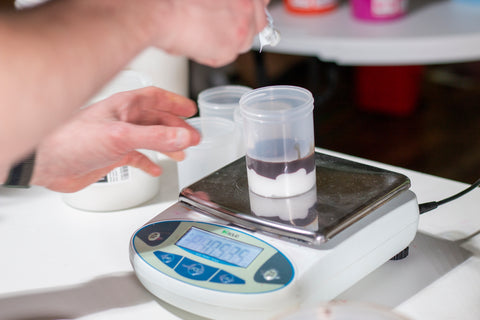Have you ever wanted to screen print with food? Ever looked down into your morning coffee and thought “I bet I could print with this”? Ronald Peters decided to give coffee ink a shot (get it?). He used techniques from natural dyeing processes, got a little creative with his own mix, and tried screen printing with coffee.
GATHERING SUPPLIES
When screen printing with coffee or any natural dye, there are a few things you’ll need to know beyond just how to make the dye. First, shirt fabric. Use 100% cotton garments so the mixed dye can seep into the fabric as much as possible.
Have you ever tie-dyed a garment? In order for the dye to adhere to the garment, you need to soak the shirt. This applies to screen printing with coffee too. It helps the dye stay vibrant and not wash out immediately.
High mesh screens are best for the job since the mixed dye will resemble water-based ink more than plastisol. In the experiment, Ronald uses a 305 thin-thread mesh.
RELATED: HOW TO CHOOSE THE RIGHT MESH COUNT FOR THE JOB

MIXING COFFEE GROUNDS
Alright, now let’s talk about the most important part: mixing the dye. The internet has a ton of suggestions of how to print with natural ingredients, including coffee. Here are a few options.
Option 1: Coffee Grounds with Vinegar
Bring the ingredients to a rolling boil for a few minutes, then simmer for about 30 minutes. This mix will make your kitchen smell like coffee and vinegar. It’s an odd smell.
Option 2: Instant Coffee in Water
Make your favorite Instant Coffee in a pot or pan on the stove. Bring it to a boil, then reduce the heat and let it simmer for half an hour.

USING ADDITIVES
According to many articles, this coffee/vinegar combo should do the trick. However, adding screen printing additives to the coffee mixture will make it print more like an ink. The downside? You can’t drink it anymore.
Additive 1: Green Galaxy Clear Core
Green Galaxy Clear Core is a transparent water-based ink that allows the printer to add water-based pigment to create color and Pantone match. Since it’s a finished, printable ink on its own, adding coffee to it may be just what Ronald is looking for. He mixes a 70/30 ratio of Clear Core to coffee.
Additive 2: Fumed Silica Additive
This is a powder designed to thicken any liquid it touches. The goal is to create the closest version of ink as possible. Ronald adds the fumed silica until the coffee mix begins to look less like a morning pick-me-up and more like a printable ink.
Dyes have been mixed, let’s get to printing.

PRINTING WITH COFFEE
Method 1: Fumed Silica and Coffee Grounds
The first thing Ronald noticed was that he added way too much silica base to the instant coffee mixture and wasn’t able to clear the screen. The print is super light and doesn’t show up in areas. Ronald decides to scrap both mixes with fumed silica and continue with Clear Core and coffee.
Method 2: Clear Core and Instant Coffee
Since Clear Core is already a printable ink, this mixture had the consistency of water-based ink and cleared the screen. It’s also a pleasing mocha color, which is perfect for printing a bag of coffee beans.
Method 3: Clear Core and Coffee Grounds
The consistency of this mix is a little off. Ronald suggests he may have added too much of the coffee grounds and vinegar mixture. The color is much lighter than the Instant Coffee and Clear Core mix.

FINAL THOUGHTS
Dyeing shirts with coffee isn’t exactly screen printing, but it can look awesome when done well. Ronald’s personal favorite is the instant coffee and fumed silica mix. The color is dark and covered well. The runner-up is the instant coffee and Clear Core mix. It turned out a lighter color but still created a great-looking print.
Surprisingly, Instant Coffee gave better overall results. Take note, coffee printers: save your spent coffee grounds for fertilizing plants and skincare.
Note: These designs did not pass the wash test. Soaking the garment before printing may also help. Make sure to test any adjustments you make to the process. Check out the sources below to learn more about dyeing garments with coffee and other natural sources.

